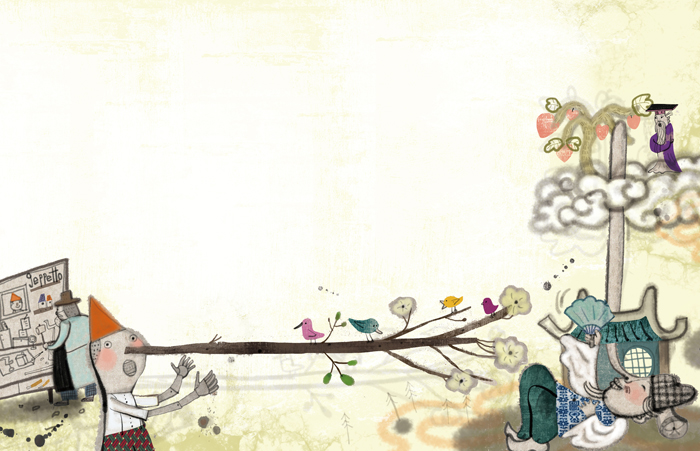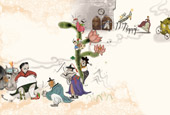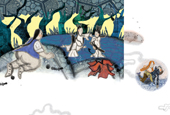-
 Korea.net's 24-hour YouTube channel
Korea.net's 24-hour YouTube channel- NEWS FOCUS
- ABOUT KOREA
- EVENTS
- RESOURCES
- GOVERNMENT
- ABOUT US
View this article in another language
- 한국어
- English
- 日本語
- 中文
- العربية
- Español
- Français
- Deutsch
- Pусский
- Tiếng Việt
- Indonesian
We all know how the story of good old Pinocchio goes—whenever the beloved wooden puppet would tell lies, his nose would grow. His adventures depict the wonderful world of children’s imaginations and gives them a lesson in being honest.
While the classic children’s story is universally well known, other tales from different regions are seemingly identical to Pinocchio. Comparatively fun and instructive, the Korean fable The Magic Folding Fan is one of them. The Magic Folding Fan, which focuses on the important life lesson that too much is as bad as too little, tells the story of an old penny-pincher who plays childish pranks on people by making their nose grow with a red paper fan.
After making their noses grow, he gets paid to place their nose back in the right place using a blue paper fan. Having earned enough money to enjoy his life, he gets greedier than ever. One day, the awful miser fans his own nose to reach up to the sky in order to steal the Great Jade Emperor’s heavenly peach. Curious at what is moving his precious peach, the emperor has the old man pulled up by his nose. With his blue fan, the old man quickly reduces his nose, but that quickens the time it takes him to reach the sky. Suddenly, the nose slips out of the hands of the emperor’s courtiers, and the man falls to the ground and dies.

Nowadays, more stories will talk about nose jobs than growing a nose, but not a small number of old books used noses to symbolize characters’ intentions and nature.
Both fables use this to carry on the story, but they diverge in different directions from the setting. Pinocchio is a good-hearted puppet whose goal is to become a real boy, and he has Jiminy Cricket as his conscience. Pinocchio may often end up in trouble, but he always has Jiminy to rescue him. Naïve as ever, his nose grows long when lying and shortens when telling the truth, and it’s clear in the story that the character’s behavior come from his pure curiosity as a young boy or puppet.
The Magic Folding Fan, in contrast, begins from the old man’s true bad intentions to deceive people for his own good. He doesn’t have any fairies or crickets to guide him when going off in the wrong direction in life. While Pinocchio learns his lesson and a happy ending follows, the covetous old man gets a rather bleak ending: death.
Teaching children that too much is as bad as too little is great. But considering The Magic Folding Fan’s target readers, one could raise some questions: Is human nature fundamentally evil? Do evil people never get a chance to change their ways?
*The series of old Korean tales has been made possible with the cooperation with Korea Magazine.
While the classic children’s story is universally well known, other tales from different regions are seemingly identical to Pinocchio. Comparatively fun and instructive, the Korean fable The Magic Folding Fan is one of them. The Magic Folding Fan, which focuses on the important life lesson that too much is as bad as too little, tells the story of an old penny-pincher who plays childish pranks on people by making their nose grow with a red paper fan.
After making their noses grow, he gets paid to place their nose back in the right place using a blue paper fan. Having earned enough money to enjoy his life, he gets greedier than ever. One day, the awful miser fans his own nose to reach up to the sky in order to steal the Great Jade Emperor’s heavenly peach. Curious at what is moving his precious peach, the emperor has the old man pulled up by his nose. With his blue fan, the old man quickly reduces his nose, but that quickens the time it takes him to reach the sky. Suddenly, the nose slips out of the hands of the emperor’s courtiers, and the man falls to the ground and dies.

Nowadays, more stories will talk about nose jobs than growing a nose, but not a small number of old books used noses to symbolize characters’ intentions and nature.
Both fables use this to carry on the story, but they diverge in different directions from the setting. Pinocchio is a good-hearted puppet whose goal is to become a real boy, and he has Jiminy Cricket as his conscience. Pinocchio may often end up in trouble, but he always has Jiminy to rescue him. Naïve as ever, his nose grows long when lying and shortens when telling the truth, and it’s clear in the story that the character’s behavior come from his pure curiosity as a young boy or puppet.
The Magic Folding Fan, in contrast, begins from the old man’s true bad intentions to deceive people for his own good. He doesn’t have any fairies or crickets to guide him when going off in the wrong direction in life. While Pinocchio learns his lesson and a happy ending follows, the covetous old man gets a rather bleak ending: death.
Teaching children that too much is as bad as too little is great. But considering The Magic Folding Fan’s target readers, one could raise some questions: Is human nature fundamentally evil? Do evil people never get a chance to change their ways?
*The series of old Korean tales has been made possible with the cooperation with Korea Magazine.
Most popular
- First hearing-impaired K-pop act hopes for 'barrier-free world'
- 'Mad Max' director impressed by 'cinema-literate' Korean viewers
- Romanian presidential couple visits national cemetery
- 'Korean mythology is just as wonderful as Greek and Roman'
- Hit drama 'Beef' wins awards from 3 major Hollywood guilds
















